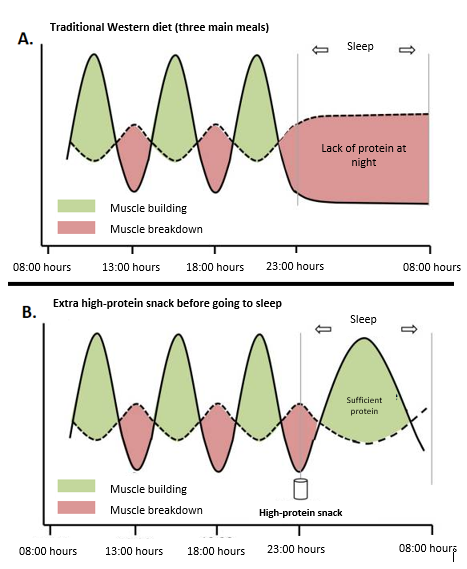Sleep yourself strong!

Build muscle while you sleep or at least prevent muscle breakdown: while this may sound like an impossible dream to many people, in recent years it has become increasingly clear that this is actually possible. Most people do not make sufficient use of their night’s rest to optimise muscle recovery and the effects of their training in the previous day. This means they are missing out on a significant part of the potential benefits.
As discussed in the previous blog, for the optimal use of protein by the muscles, it is important that the correct total amount consumed is spread out in multiple portions throughout the day. Each portion should be minimally 20 grams. In a ‘traditional’ Western diet, almost all protein is consumed during the three main meals and the largest amount is consumed during the only hot meal of the day. However, research shows that muscle building is not optimal with such a diet: a uniform distribution of the consumption of protein over the day leads to greater muscle growth and recovery. This ensures that from early in the morning to late in the evening there is a continuous supply of the building blocks for this continuous process.
These research results indicate that many athletes do not make full use of a significant part of the day for optimal muscle building and recovery. For example, in a typical diet, almost all protein is consumed within a period of about twelve hours, i.e. starting with breakfast through to dinner. In the subsequent twelve hours (evening and night), many people do not consume any protein. Many people even eat a breakfast that contains hardly any protein because only breakfast cereals, bread, and savoury toppings are on the menu. So, the supply of amino acids to the muscles is interrupted between dinner and the next afternoon. This means that during this period of time, there is a shortage of the building blocks needed for muscle building and recovery. This is illustrated in the figure below.

Figure 1: Diagram showing the supply of nutrients (protein) to the muscles in a diet with three main meals without (A) and with (B) an extra high-protein snack before going to sleep. The extra high-protein snack stimulates muscle building by improving the total consumption and the distribution over the day. Source: Trommelen, et al, 2016.
Eating an extra high-protein snack before going to sleep minimises muscle breakdown during the night. Although the high-protein snack increases the total consumption and the distribution of protein throughout the day, it should not be forgotten that this snack adds extra calories. So, it will be necessary to reduce the consumption of fats or carbohydrates at some other part of the day to avoid adding fat. Recent research confirms that the extra snack shortly before sleeping does indeed provide larger muscle mass as well as increased muscle strength. In particular, this increase was greater than when the same amount of protein was added to the usual meals and snacks throughout the day between breakfast and dinner. So, to attain optimal muscle building, the recommendation is to eat a snack shortly before going to sleep that preferably contains a minimum of 30 grams and a maximum of 40 grams of protein. For example, this is easily achieved by eating ± 300 grams of quark or drinking a protein shake. If you choose a shake, make sure that it does not contain whey protein, but rather mostly casein protein. In contrast to whey protein, casein is consumed slowly by the body. This results in a protracted gradual supply of nutrients (amino acids) to the muscles during the night.
Summary
To further optimise the distribution of protein consumption during the day, a high-protein snack shortly before going to sleep is an ideal supplement to a ‘traditional’ Western diet. This snack will ensure that the muscle building process has a supply of amino acids during the night and thus has sufficient nutrients for muscle building and recovery. Ideally, the snack will contain 30 to 40 grams of protein, e.g. a hefty portion of quark or a casein shake.
References
-
1. Mamerow MM, Mettler JA, English KL, Casperson SL, Arentson-Lantz E, Sheffield-Moore M, Layman DK, Paddon-Jones D.
Dietary protein distribution positively influences 24-h muscle protein synthesis in healthy adults. The Journal of Nutrition, vol 144(6) p876-880, 2014.
- https://www.ncbi.nlm.nih.gov/pubmed/24477298 -
2. Res PT, Groen B, Pennings B, Beelen M, Wallis GA, Gijsen AP, Senden JMG, van Loon LJC.
Protein Ingestion before Sleep Improves Postexercise Overnight Recovery. Medicine & Science in Sports & Exercise, vol 44(8) p1560-1569, 2012.
- https://static1.squarespace.com/static/55b7ffebe4b0568a75e3316b/t/5845ec69414fb5bcc4bb90fa/1480977513902/Protein_Ingestion_before_Sleep_Improves.20.pdf -
3. Snijders T, Res PT, Smeets JSJ, van Vliet S, van Kranenburg J, Maase K, Kies AK, Verdijk LB, van Loon LJC.
The Journal of Nutrition, vol 145(6) p1178-1184, 2015.
https://academic.oup.com/jn/article/145/6/1178/4644372 -
4. Trommelen J, van Loon LJC.
Pre-Sleep Protein Ingestion to Improve the Skeletal Muscle Adaptive Responses to Exercise Training. Nutrients, vol 8(12): 763, 2016.
https://www.ncbi.nlm.nih.gov/pubmed/27916799 -
5. Trommelen J, Kouw IWK, Holwerda AM, Snijders T, Halson SL, Rollo I, Verdijk LB, van Loon LJC
. Presleep dietary protein-derived amino acids are incorporated in myofibrillar protein during postexercise overnight recovery. American Journal of Physiology, Endocrinology and Metabolism, vol 314 (5), 2018.
https://www.physiology.org/doi/full/10.1152/ajpendo.00273.2016


